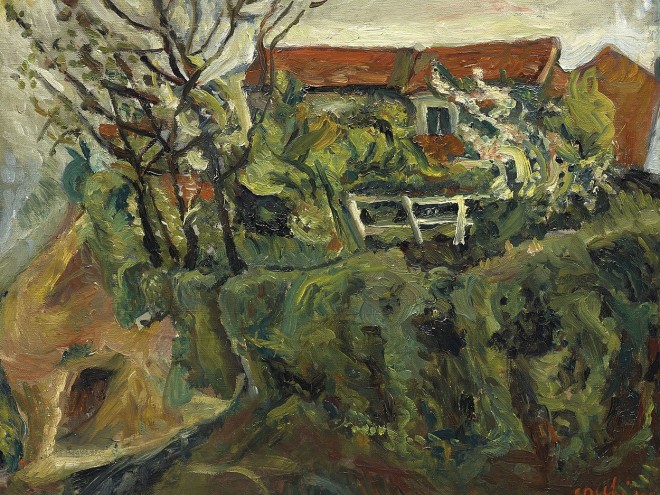There’s a district in Vilnius called Užupis, which has seceded from the rest of Lithuania and established its own republic. To get there you cross over a river on a bridge festooned in padlocks engraved with the names of lovers. On the riverbank below the bridge is the statue of a mermaid. It’s a bohemian neighborhood with its own whimsical constitution (“Everyone has the right to understand nothing,” “Everyone has the right to encroach upon eternity,” “A cat is not obliged to love its master, but it must help him in difficult times,” and so on) mounted on a wall in a dozen languages. There’s a café in Užupis with a terrace overlooking the little river, where I sat drinking beer with some Lithuanian poets. They were impressive company, the poets with their chiseled Slavic features, who recited their poems from memory and, unlike Americans, made no apologies for their art. The subject of conversation was Lithuanian identity and the national narrative the citizens were struggling to cobble together since gaining their independence from the Soviet Union. It was a narrative the Jewish component had been mostly edited out of.
“You people are so lucky,” I submitted. “You’ve been persecuted for centuries by the Russians, the Poles, the Germans, whereas I’ve had to punish myself all these years.”
Understand, I’m a cheap drunk, and the beer in Vilnius is very good, especially the dark Baltic variety with its tincture of caramel. Well past my limit (of a single beer) I was inclined to presumption. Also, I wasn’t especially sympathetic to the Lithuanian national identity crisis, having recently visited their Museum of Genocide Victims. This is the museum housed in the old KGB headquarters, a forbiddingly grim building where thousands of Lithuanian partisans were imprisoned, tortured, and murdered by the Soviets. With its punishment cells and execution chamber, it’s a chilling monument to inhumanity, and there’s no question that the Lithuanians suffered disproportionately at the hands of the Russians. But I was more than a little uncomfortable with calling their particular tragedy a “genocide.” I reminded the poets that the Jews had constituted nearly half the population of Vilnius before the war, that theirs had been arguably the richest Jewish culture in Europe. I called the roll of Jewish geniuses from Vilna — the Gaon and the Chazon Ish, Moishe Kulbak and Chaim Grade, the scholar-rabbis, the Yiddish authors, actors, and artists — and suggested that, if the Lithuanians were so desperate for a narrative, they could do worse than to appropriate that of the Litvak Jews. After all, while the official identity of Vilnius had long been Russian, the public life was largely Polish, and the real flavor of the streets was distinctly Jewish. The scant native Lithuanian population was, at least until recently, negligible and ghostly.
I waited for my remarks to revive some atavistic form of anti-Semitism among my listeners, who merely registered then dismissed the suggestion; my reputation as a nudge had preceded me. Lithuania, they explained, was the last nation in Europe to be converted to Christianity. In the late 14th century, when the rest of the continent was building its high gothic cathedrals, the Lithuanians, it seemed, were still worshipping trees. In their zealous quest for identity many of the young were now looking back to the mist-shrouded pagan past. Shikkered from a second beer, I recalled an item of graffiti I’d seen on a crumbling wall earlier that day. It was a more or less stick figure with a protracted middle limb and a legend chalked above it reading in English: Long Dick Boy. It struck me in retrospect that what I’d seen was a pagan scrawl from the Lithuanian Stone Age, possibly the image of some trickster god. I presented my theory to the poets, supporting it with improvised episodes from a cycle of tales about Long Dick Boy: how he stole borsht from the gods, lassoed a dragon with his schlong, etc. “And a little known fact,” I added as a postscript, “Long Dick Boy was circumcised.” I think the Lithuanians were as glad to see the back of me as I was to go home, but I cherish the souvenir hangover I brought back from my time in Vilnius.
Steve Stern is the author of several works of fiction, including A Plague of Dreamers, The Frozen Rabbi, and North of God. His honors include twoNew York TimesNotable Books, a Pushcart Writer’s Choice Award, an O. Henry Prize, and the Edward Lewis Wallant Award for Jewish American Fiction. Stern was born in Memphis, Tennessee and now lives in Saratoga Springs, New York.
Stern’s fiction, with its deep grounding in Yiddish folklore, has prompted critics such as Cynthia Ozick to hail him as a successor to Isaac Bashevis Singer. He has won five Pushcart Prizes, an O’Henry Award, a Pushcart Writers’ Choice Award and a National Jewish Book Award. For thirty years, Stern taught at Skidmore College, the majority of those years as Writer-in-Residence. He has also been a Fulbright lecturer at Bar Elan University in Tel Aviv, the Moss Chair of Creative Writing at the University of Memphis, and Lecturer in Jewish Studies for the Prague Summer Seminars. Stern splits his time between Brooklyn and Balston Spa, New York.



